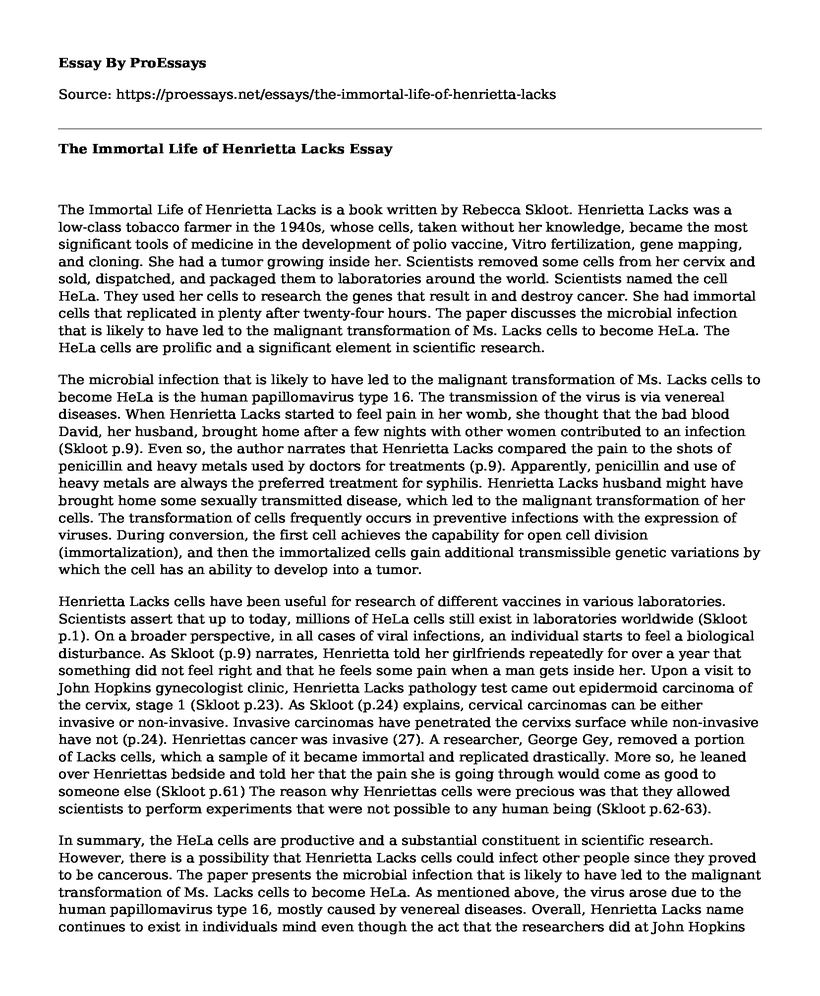The Immortal Life of Henrietta Lacks is a book written by Rebecca Skloot. Henrietta Lacks was a low-class tobacco farmer in the 1940s, whose cells, taken without her knowledge, became the most significant tools of medicine in the development of polio vaccine, Vitro fertilization, gene mapping, and cloning. She had a tumor growing inside her. Scientists removed some cells from her cervix and sold, dispatched, and packaged them to laboratories around the world. Scientists named the cell HeLa. They used her cells to research the genes that result in and destroy cancer. She had immortal cells that replicated in plenty after twenty-four hours. The paper discusses the microbial infection that is likely to have led to the malignant transformation of Ms. Lacks cells to become HeLa. The HeLa cells are prolific and a significant element in scientific research.
The microbial infection that is likely to have led to the malignant transformation of Ms. Lacks cells to become HeLa is the human papillomavirus type 16. The transmission of the virus is via venereal diseases. When Henrietta Lacks started to feel pain in her womb, she thought that the bad blood David, her husband, brought home after a few nights with other women contributed to an infection (Skloot p.9). Even so, the author narrates that Henrietta Lacks compared the pain to the shots of penicillin and heavy metals used by doctors for treatments (p.9). Apparently, penicillin and use of heavy metals are always the preferred treatment for syphilis. Henrietta Lacks husband might have brought home some sexually transmitted disease, which led to the malignant transformation of her cells. The transformation of cells frequently occurs in preventive infections with the expression of viruses. During conversion, the first cell achieves the capability for open cell division (immortalization), and then the immortalized cells gain additional transmissible genetic variations by which the cell has an ability to develop into a tumor.
Henrietta Lacks cells have been useful for research of different vaccines in various laboratories. Scientists assert that up to today, millions of HeLa cells still exist in laboratories worldwide (Skloot p.1). On a broader perspective, in all cases of viral infections, an individual starts to feel a biological disturbance. As Skloot (p.9) narrates, Henrietta told her girlfriends repeatedly for over a year that something did not feel right and that he feels some pain when a man gets inside her. Upon a visit to John Hopkins gynecologist clinic, Henrietta Lacks pathology test came out epidermoid carcinoma of the cervix, stage 1 (Skloot p.23). As Skloot (p.24) explains, cervical carcinomas can be either invasive or non-invasive. Invasive carcinomas have penetrated the cervixs surface while non-invasive have not (p.24). Henriettas cancer was invasive (27). A researcher, George Gey, removed a portion of Lacks cells, which a sample of it became immortal and replicated drastically. More so, he leaned over Henriettas bedside and told her that the pain she is going through would come as good to someone else (Skloot p.61) The reason why Henriettas cells were precious was that they allowed scientists to perform experiments that were not possible to any human being (Skloot p.62-63).
In summary, the HeLa cells are productive and a substantial constituent in scientific research. However, there is a possibility that Henrietta Lacks cells could infect other people since they proved to be cancerous. The paper presents the microbial infection that is likely to have led to the malignant transformation of Ms. Lacks cells to become HeLa. As mentioned above, the virus arose due to the human papillomavirus type 16, mostly caused by venereal diseases. Overall, Henrietta Lacks name continues to exist in individuals mind even though the act that the researchers did at John Hopkins clinic was unethical.
Work Cited
Skloot, Rebecca. The Immortal Life of Henrietta Lacks. 2010. Web. 16th Dec. 2016.
Cite this page
The Immortal Life of Henrietta Lacks. (2021, Mar 29). Retrieved from https://proessays.net/essays/the-immortal-life-of-henrietta-lacks
If you are the original author of this essay and no longer wish to have it published on the ProEssays website, please click below to request its removal:
- Factors that Form the Learning Gap Between Clinical and Classroom Theories in Saudi Arabia Among Nursing Students
- Essay Example: Accessibility Issues for Disabled Students on College Campuses in 2018
- Synapse and Dysfunction in Alzheimer Essay
- The Effectiveness of Surveillance Systems in Monitoring Cancer in the United States Paper Example
- Job Satisfaction: Achieving Balance in a Multicultural Workplace - Essay Sample
- COVID-19: Global Pandemic With 166 Countries Affected - Essay Sample
- Essay Example on Loss for Words







